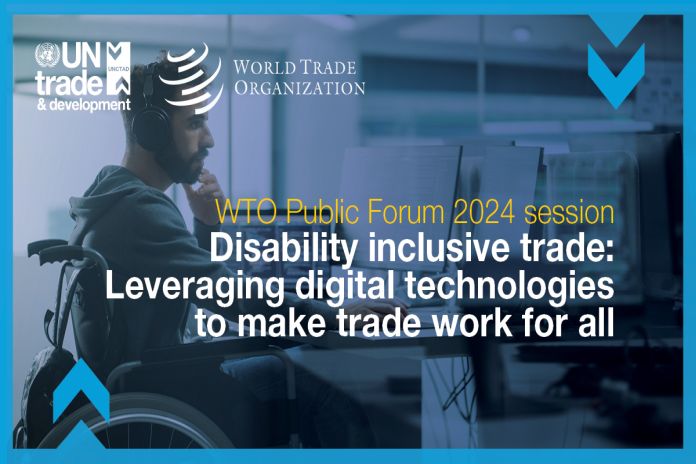- Deputy Executive Director Dorothy Tembo delivered the closing remarks for the Disability Inclusive Trade panel during the WTO Public Forum 2024. (Geneva, Switzerland)
By Dorothy Tembo
International Trade Centre (ITC) is proud to be here alongside the members of this new interagency working group on trade and disability inclusion. And while the establishment of this group caps many months of preparatory work, I can promise you this: the best is yet to come.
Approximately 1.3 billion people live with some sort of disability. That’s one person out of every six. They are our family members, our friends, our neighbours, ourselves. And for them, now more than ever, we need to achieve better trade for a better world, as this year’s WTO Public Forum has called upon us to do.
Today, we’ve heard from an impressive slate of panellists, who together have given us a preview of what we can expect from this new inter-agency working group on disability inclusion and trade. We’ve heard from WTO deputy director-general Angela Ellard, who along with setting the stage so thoughtfully, was part of the launch of the first study to look at how trade agreements can foster disability inclusion.
We’ve heard from Luz Maria de la Mora Sanchez, director of the division on International Trade and Commodities at UNCTAD, whose session on enhancing disability inclusion across the international trading system last year gave this issue a public profile in Geneva that it had long lacked.
We’ve heard from Dan Rees, director of the priority action programme on supply chains at the ILO, which has played a pivotal role in showing what the employment and wage landscape looks like for people with disabilities.
We’ve heard from Ilkka Saarinen, director for the trade policy unit, ministry of foreign affairs, Finland, on why his country believes so deeply in disability-inclusive trade and is giving crucial financial support for new research.
And we’ve heard from Amrita Bahri and Mariangela Linoci, whose groundbreaking work on disability inclusion and trade policy is helping shed light on issues that have often been left to languish in the dark.
You make me excited and hopeful for the future.
At ITC, we’ve had the privilege of working with many small businesses who are creating new products and services -often with digital technologies – that make it possible for more persons with disabilities to take full part in society.
And who are making sure that their firms employ people with disabilities and incorporate their perspectives in how they work and what they do.
These businesses are teaching us how to look at trade in a better, more inclusive way – and they never waver in their commitment towards changing their communities for the better.
Now, they need all of us to do the same.
To champion disability-inclusive trade in every forum we have. To counter misconceptions and show the international community that disability-inclusive trade goes hand in hand with a prosperous, fairer world. To pool our time, talents, and resources towards making disability-inclusive trade a global reality. To recognize that disability inclusion is, by definition, an intersectional issue, and that we must also consider gender, age, ethnicity, and the many other facets of any given person’s identity.
You can expect to hear much more from this inter-agency working group over the months and years to come, and we encourage other Geneva-based organizations working in trade to join us. And on behalf of ITC, I pledge that we will do everything in our power to help ensure this work delivers on its promise.
Five years ago, the UN secretary-general launched a disability inclusion strategy for the entire United Nations system, recognizing that this is a human rights imperative.
It’s a comprehensive, transformative strategy, one that covers areas ranging from procurement to leadership to event accessibility.
Since then, we’ve stepped up our efforts at ITC to make sure that disability-inclusive policies and practices are woven into the very fabric of who we are as an organization.
I’m excited to report that, for the first time since this UN strategy was launched, ITC has now been able to contribute detailed updates across each of the strategy’s 15 indicators – showing how we are approaching, meeting, or exceeding their requirements. And we plan to keep building on this work in the months and years to come.





